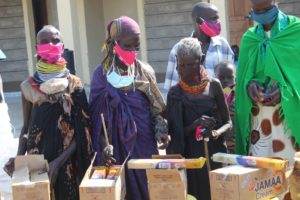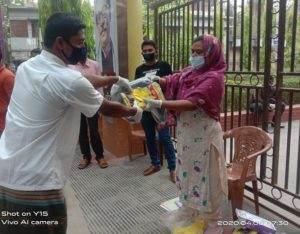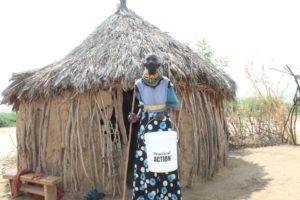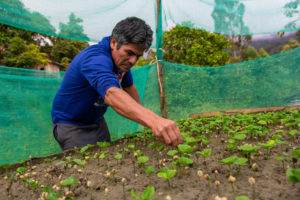We’re working with private businesses, local authorities and national governments to help vulnerable people get the support and supplies they need the cope with the pandemic.
The situation in each of the countries we work in varies hugely and in each case, our work has altered according to the needs of the communities we work with. Throughout, we’ve remained true to the values of Practical Action and used the expertise of our staff to limit the spread of the virus, help communities keep essential systems running and support longer-term recovery.

Our work supporting the most vulnerable during the pandemic is reliant on a global network of experts, partners, consultants and donors.
Limiting the spread in Asia
We’ve used our existing networks to get information and much needed supplies to remote communities on the ground.
We’ve focused on disseminating knowledge to remote urban and rural communities on the importance of handwashing, mask wearing and social distancing, as well as providing essential personal protective equipment (PPE).
In low-income slum areas in India, we’re supporting 8,000 families to access soap, water and cleaning supplies to maintain good hygiene. We’ve distributed kits containing masks, hand soap, disinfectant and washing powder.
We’ve supplied communities with toilet cleaning equipment to keep facilities hygienic as possible. Until these kits were distributed, people weren’t using them for fear of contracting the virus.

In Bangladesh, we’ve provided PPE kits to over 1,000 waste and sanitation workers to help protect them from the virus. We are also working with the United Nations Development Programme on a humanitarian response programme.
A vehicle with a loudspeaker has been travelling through communities broadcasting messages about how to keep safe. We’ve put up posters displaying important health information at community meeting points and distributed leaflets.
We’ve distributed 300 PPE kits to sanitation workers and volunteers to protect them from coronavirus and any other infections.
Sarat Chandra Das, 51, is a husband and father of three living in Trinathpali, India. Sarat lost his leg to leprosy and so is unable to work. The family couldn’t afford soap and cleaning materials and were struggling to access food once lockdown was imposed. We’ve helped Sarat get food, cash for essentials, hygiene kits and cleaning supplies to keep himself and his family safe and protected.
In Nepal, we’ve helped people get PPE and thermometers to help identify and quarantine those who are sick, reducing the transmission rate of the virus.
Many communities in Nepal, such as Bardiya, are vulnerable to flash flooding caused by climate change. We’ve provided access to essential food supplies alongside hygiene equipment and used posters to raise awareness of the importance of social distancing and mask-wearing. This work has taken place in partnership with the Zurich Flood Resilience Alliance.
We’re working with dairy farmers in Nepal to help them become more resilient to the impacts of coronavirus through supporting them to diversify the products they sell at market to maximise their income.
Delivering vital supplies in Africa
We’ve been working through our existing networks to get information and much needed supplies to remote communities on the ground.
We’ve revised existing projects, so that energy for water supplies which would have been used solely for irrigation are able to provide better access to handwashing facilities. Unspent funds have been used to build public handwashing facilities and to enable women in slums to get sanitary products.
In remote Turkana, in northern Kenya, our staff are taking part in local language radio shows which broadcast messages around regular handwashing, social distancing and the importance of looking out for symptoms of coronavirus to hundreds of villages.

We’ve distributed buckets, soap and other cleaning supplies, to homes in Turkana, which regularly face chronic drought conditions. This has been facilitated by our network of community health volunteers, who we provided with PPE.
Catherine Akatela is a 48–year–old mother of four living in Hewani village in Turkana. She said: “The containers have allowed me to store up more water for my family as well as set up a hand washing facility with soap.”
Catherine is now more confident that her family will survive this tough period, despite it being difficult for her and her husband to make ends meet due to Government restrictions.
In the informal settlements in Kisumu, our staff have been busy working with private sector manufacturers of sanitary products to provide emergency supplies for free to people who are unable to afford them.
In Sudan, our staff have combined their efforts and resources across projects to respond to coronavirus by providing all communities we work with essential sanitation and hygiene materials. This is on top of raising awareness about the pandemic and prevention methods.
In total, 111,000 people in Kassala, eastern Sudan benefited from:
- 15 public handwashing facilities in public locations.
- Community-based sanitation and hygiene promotion through the community volunteers and health promoters who are trained by Practical Action.
- Support to sanitation-related small business
- Information on key messages about the virus, via 150 posters, podcasts played via loudspeakers in the main mosques in the area and via vehicles with loudspeakers.
As work in Sudan has resumed and school examinations have started. Our office in Kassala has provided examination centres with sanitising equipment and pupils with soap, individual cups, water containers, and reusable facemasks. We’ve also organised orientation sessions for all pupils and teachers on coronavirus prevention measures.
In Darfur, in Western Sudan, we’ve taken part in a joint emergency working group where 100 of our trained health promoters play an active role in sharing and dissemination of knowledge about coronavirus and we have also broadcast messages on local radio stations.
In Blue Nile, we have rehabilitated two solar-powered water pumps and built a number of public latrines in public spaces.
In Southern Africa, we’ve also used radio stations to broadcast awareness messages five times a week and worked with communities to install tippy taps, which reduce the risk of passing coronavirus at communal water points.
Over the coming months, we’ll rehabilitate more boreholes, increase drilling and installation of solar powered pumps for gardens to improve nutrition and reduce susceptibility to the symptoms of coronavirus.
Broadcasting for change in Latin America
There has been an increase in gender-based violence around the world since lockdown restrictions came into force. Our Bolivia team has worked with the national Government and partners to create a course on gender violence, which has been taken by more than more than 1000 local Government staff. It’s helping them recognise at-risk people and intervene appropriately to protect them.

We’re working with smallholder farmers in Bolivia to help them deal with the pandemic and reduce its effect on their livelihood. We’re working with smallholder farmers in Bolivia to help them deal with the pandemic and reduce its effect on their livelihood.
We’re working with local media and health centres in Bolivia to create public health information, which we’re communicating through social media platforms and broadcast media. We’re regulars on local radio, broadcasting in multiple languages on subjects such as hygiene procedures and interpreting lockdown restrictions.
The isolated community of San José de Lourdes in Peru, where we’re working on a conservation project, was having difficulty getting not just cleaning and disinfectant products, but food as well. We delivered these vital supplies, along with seeds so the community could grow more of their own food.
In the upper area of Lima, Peru, the community of San Miguel de Viso was also isolated, putting their food security at risk. We switched from helping people replant forests to helping them plant food crops, securing a supply of food for future months. We also produced short manuals for vegetable production and plant nursery activities.
It’s a critical moment for indigenous people in Peru. The health crisis has worsened the Amazon’s most pressing problems, particularly its patchy access to health services. Our project manager spearheaded a fundraising campaign to buy an oxygen machine for Condorcanqui, a heavily impacted area in the Amazon, where we work with the cacao producers.
Working together around the world
Coronavirus has made our powerful network of expertise even more vital. Sharing knowledge between our country offices in Asia, Africa and Latin America means we can work together to fight the challenges the pandemic brings.
Work like this is only possible because of your support. Thank you for being part of the Practical Action family. We’re very proud to have you with us as we work hard to reduce the impact of coronavirus on vulnerable communities around the world.